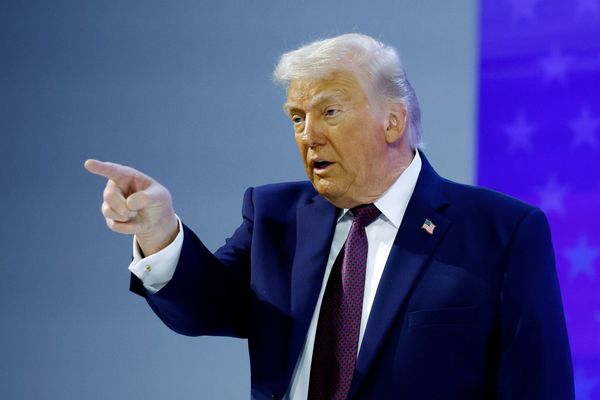
What should senior politicians do after politics? Disappear into obscurity, earn enormous sums of money on the speech circuit or by lobbying for dodgy high-finance outfits, or start a buddyish podcast? The last example has been notably set by the former cabinet minister Rory Stewart and Labour’s one-time director of communications Alastair Campbell with their highly successful The Rest Is Politics show.
The format, with its reliance on blokeish repartee, is not for everyone, and most former PMs would doubtless struggle to make the transition from statesmanship to banter, with the obvious exception of Boris Johnson, who never could distinguish between the two. In any case, pontificating for digital download would look a bit of a comedown for anyone who once ran the country – however badly they ran it.
Further down the pecking order, the podcast, with its cult of personality, posture of independence and potential for highly lucrative contracts, obviously has its attractions, for George Osborne and Ed Balls have just announced that they are launching an economics podcast. Balls was Osborne’s harrying shadow for four of the six years that he was chancellor of the exchequer. For the past year they have been finessing their double-act on The Andrew Neil Show, following in the illustrious footsteps of Michael Portillo and Diane Abbott. “Ed and I are frenemies – once bitter foes, and now firm friends,” said Osborne.
Anyone who has witnessed the yah-boo antics of the House of Commons can agree that there is something to be said for taking the bitterness and rancour out of politics. And that whole Corbynista never-kissed-a-Tory tribalism approach to inter-party relations always looked childishly performative – after all, Corbyn’s great hero Tony Benn called Enoch Powell his friend.
Moving to the centre, while consensus politics can appear dull and complacent, you only have to look at what’s taking place in the US, where deep sectarian divisions have opened up in society, to feel a certain nostalgia for the more civil era of bipartisanship. Those were the days, as the American writer George Packer put it, when the “D or R after a politician’s name did not tell you what he thought about everything, or everything you thought about him”.
Still, there are limits. Can all political differences really be reconfigured as entertainment, all ideological and moral standpoints reduced to faux tensions between “frenemies”? It’s one thing to hear the rehearsed anecdotes going back and forth between Stewart, who was a cabinet minister for only two months and more a maverick throwback than hardcore Tory, and Campbell, who we and he often forget was never actually a politician.
Osborne was the architect of a programme of austerity that has wreaked long-lasting social, structural and infrastructural damage. In just one metric of what that means, a 2020 study by the University College London Institute of Health Equity found that, since 2010, life expectancy for both men and women in the UK had slowed dramatically and was beginning to drop. In contrast, child poverty, food banks and homelessness all saw rapid rises.
Osborne’s reward, before he even stood down as an MP, was to be made editor of the London Evening Standard by its owner Evgeny Lebedev, with whom, like many leading British politicians, he had established close relations. He also became a senior adviser to the investment management company BlackRock and a partner at his brother’s private investment firm 9Yards Capital.
You don’t have to be a rabid anti-capitalist to be a little perturbed at the effortless manner in which Osborne, having left his unhealthy mark on the nation’s wellbeing, slipped from public life into a well-recompensed private one. It’s not that he should be placed in public stocks, either literally or figuratively; more that the medium of the podcast seems a conspicuously inadequate environment in which a meaningful interrogation of his record might take place. For a start, it bears more relation to the “zoo” broadcasting of morning DJs, with their enforced bonhomie and illusion of intimate access, than to any kind of forum of fearless scrutiny.
Then there is Osborne’s interlocutor. Balls, husband of Labour’s shadow home secretary Yvette Cooper, is said to be interested in reviving his political career, but even in the post-Trump, post-Johnson world in which the line between politics and showbiz has become dangerously blurred, he is now too firmly rooted in popular entertainment to regain credibility.
A veteran of Strictly Come Dancing and Celebrity Best Home Cook (which he won), and currently a presenter on Good Morning Britain, Balls knows enough about image maintenance to avoid harming his and Osborne’s buddyish brand by allowing any genuine reckoning to take place.
As ever, there are two sides in any argument, and Osborne and his supporters will cite the huge debt and terrible mess he inherited after the 2008 financial crisis, and the need to get the government’s house in order. But the truth is he was all in favour of the light-touch regulation of the financial markets that led to the crisis. A further truth is that it was the poor who paid for it, while the financiers continued to thrive, and the rich got inexorably richer.
We seem to have absorbed this extraordinary reality so fully that it has become both normalised and the cause for the kind of “they’re all in it together” cynicism that has fuelled the rise of populism and conspiracy theory. After 13 years of Tory rule, the country feels directionless and demoralised, and in urgent need of a wide-ranging rethink of how we organise society, create wealth and distribute its benefits. In other words, there could be no more pressing subject to explore than economics.
Let’s hope that Osborne and Balls completely upend expectations, but an ersatz exchange of ideas between a couple of bantering chums is really not what’s required.







